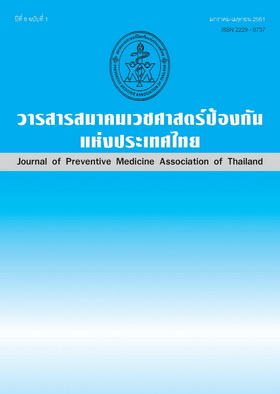The Prevalence and Associated Factors of Depression in ESRD on Hemodialysis in Phra Nakhon Si Ayutthaya Hospital
Abstract
Depression is a common psychiatric disorder in patients affected by chronic kidney disease. If it is early diagnosed, the mortality rate and the disability could be reduced and the quality of life could be improved. This study aimed to investigate prevalence and associated factors of depression among end stage renal disease patient on hemodialysis in Phra Nakhon Si Ayutthaya Hospital, Phra Nakhon Si Ayutthaya Province.
A cross-sectional study was conducted in 91 end stage renal disease patients, who visited hemodialysis unit in November-December 2017. General demographic data questionnaire and the Patient Health uestionnaire Thai-version (PHQ-9 Thai-version) were used to identify depression. Descriptive statistics were employed to describe sample characteristics and prevalence. Multiple logistic regression was performed for testing the
associations between depression and related factors. The p<0.05 was considered as a statistical significance.
The results showed that 17.6% had depression (PHQ-9 ≥9). There were 2 factors that had statistically significant association with depression: dialysis duration for less than 4 years (OR=3.91 95%CI 1.23-12.45) and family conflict (OR=6.36 95%CI 1.58-25.63). Depression in end stage renal disease patients still has problems and complications. It suggests encouraging the patient to psychological adjustment evolves towards an acceptance of the disease and a significant reduction in the psychological symptoms of depression. In addition, family counseling and referral to psychiatrist should be provided for treatment.
References
2. จุฑามาศ วารีแสงทิพย์. การฟื้นฟูคุณภาพชีวิตของผู้ป่วยไตวายเรื้อรังระยะสุดท้ายด้วยธรรมปฏิบัติ (The Improvement of the Quality of Life of the End Stage Renal Disease Patients by Dhamma Practice). กรุงเทพฯ: สมาคมโรคไตแห่งประเทศไทย. 2554.
3. Teles F, Azevedo VF, Miranda CT, Miranda MP, Teixeira MdoC, Elias RM. Depression in Hemodialysis Patients. Clinics Sao Paulo. 2014;69:198-202.
4. Sinatra M, Curci A, Palo VD, Monacis L, Tanucci G. How Dialysis Patients Live: A Study on Their Depression and Associated Factors in Southern Italy. University of Bari. 2011; 2(9):969-77.
5. McCurdy MP. Factors related to depression in end-stage renal disease patients [A Thesis Submitted to the Faculty, Master of Science]. Chattanooga, Tennessee: The University of Tennessee; 2014.
6. Fabrazzo M, Santo RM. Depression in Chronic Kidney Disease. Naples: Department of Psychiatry, Second University of Naples. Semin Nephrol. 2006;26:56-60.
7. Shayan S, Candace DG, Olufemi A, Joseph M, Farah K, Ana CR. Depression in Chronic Kidney Disease and End-Stage Renal Disease: Similarities and Differences in Diagnosis, Epidemiology, and Management. Kidney International Reports 2017;2:94-107.
8. Li Y, Shapiro B, Kim J, Zhang M, Porszasz J, Bross R, et al. Association between quality of life and anxiety, depression, physical activity and physical performance in maintenance hemodialysis patients. Chronic Dis Transl Med. 2016;2:110-9.
9. Lotrakul M, Sumrithe S, Saipanish R. Reliability and validity of the Thai version of the PHQ-9. BMC Psychiatry. 2008;20:46.
10. Chiang HH, Guo HR, Livneh H, Lu MC, Yen ML, Tsai Ty. et al. Increased risk of progression to dialysis or death in CKD patients with depressive symptoms: a prospective 3-year follow-up cohort study. J Psychosom Res. 2015;79:228-32.
11. Wikipedia, Kübler-Ross model [Internet]. 2017 [cited 2018 Jan 9]. Available from: https://en.wikipedia.org/wiki/Kübler-Ross_model
12. Nicholas SB, Kalantar Zadeh K, Norris KC. Socioeconomic disparities in chronic kidney disease. Adv Chronic Kidney Dis 2015;22:6-15.
13. Song MK, Ward SE, Hladik GA, Bridgman JC, Gilet CA. Depressive symptom severity, contributing factors, and self-management among chronic dialysis patients. Hemodial Int. 2016;20:286-92.
Downloads
Published
How to Cite
Issue
Section
License
บทความที่ลงพิมพ์ในวารสารเวชศาสตร์ป้องกันแห่งประเทศไทย ถือเป็นผลงานวิชาการ งานวิจัย วิเคราะห์ วิจารณ์ เป็นความเห็นส่วนตัวของผู้นิพนธ์ กองบรรณาธิการไม่จำเป็นต้องเห็นด้วยเสมอไปและผู้นิพนธ์จะต้องรับผิดชอบต่อบทความของตนเอง






